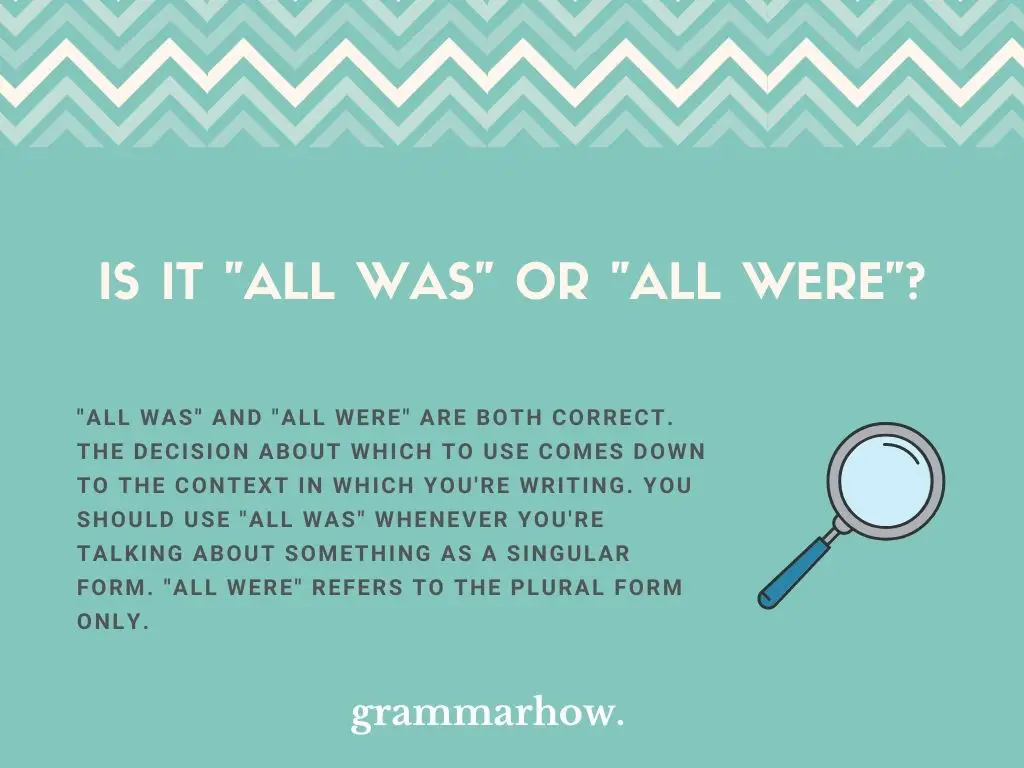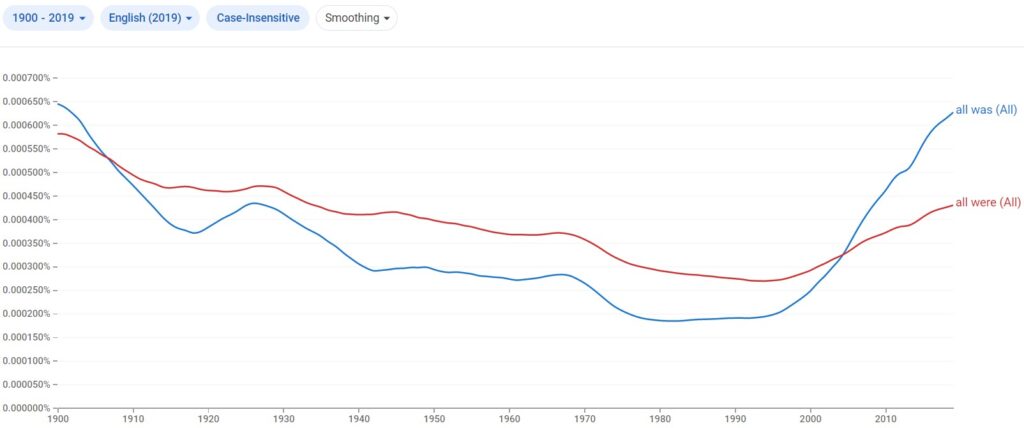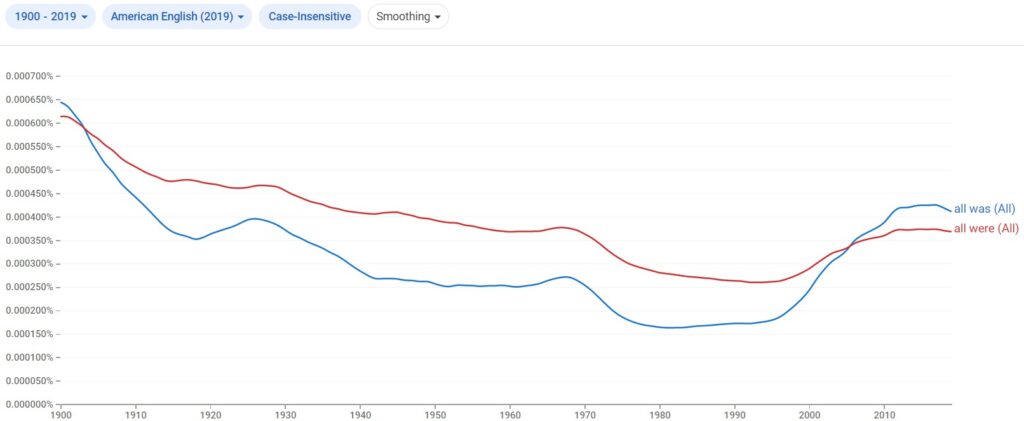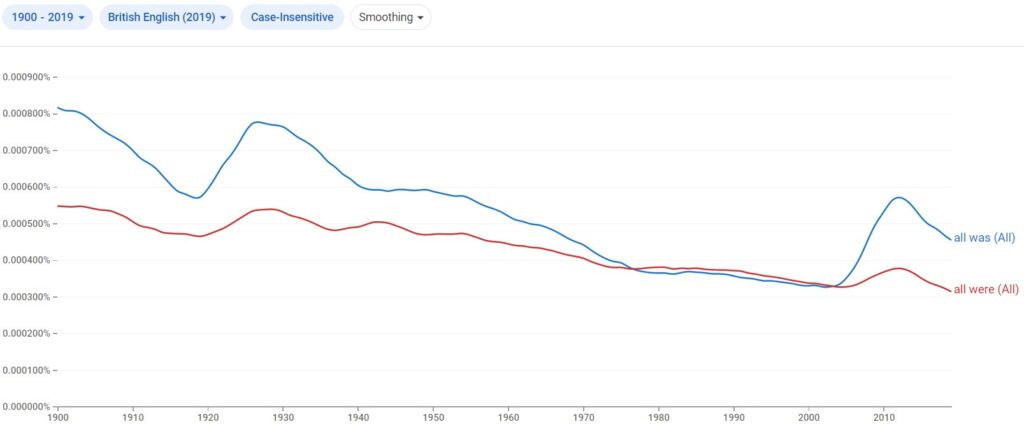“All” is an interesting word because the decision about whether it’s singular or plural isn’t based on itself. Instead, we base that decision on the other noun we use in the sentence. This article will show you how different rules make both “all was” and “all were” correct.
Is It “All Was” Or “All Were”?
“All was” and “all were” are both correct. The decision about which to use comes down to the context in which you’re writing. You should use “all was” whenever you’re talking about something as a singular form. “All were” refers to the plural form only.

As long as you can remember this distinction, you’ll have an easy time figuring it out.
“All” technically becomes a collective noun when we use singular nouns around it. That’s why “was” is the best choice, as “was” is the verb form we use whenever we’re handling singular nouns.
If we’re dealing with countable nouns or plural forms, “all” also turns into a plural word. For instance, if we say “all of the people” or “all of the houses,” then we know that “all” should be following plural rules. This means “were” is the more suitable choice.
When Should I Use “All Was”?
“All was” is the singular form. We use it when there is only one thing to mention, or we are treating “all” as a collective phrase. It works well in many cases, and you’ll usually find that it’s the more popular choice of the two.
We can use “all” to mean “everything,” and if we do not elaborate with specific objects, “all was” is correct. For example, “all was happy” means that “everything (or everyone) was happy.”
- All was quiet in the neighborhood. I couldn’t believe it!
- All was not as it seemed. I’m sure there was more to it than I first realized.
- All was not okay. I wanted to find out whether someone had said something, but I didn’t know who to ask.
- All of it was broken. I wish I could have found the guy that did it. I don’t know what I would have done, though.
- All I got was this lousy broach. I didn’t even ask for this stupid thing!
- All it took was a bit more pressure. I managed to convince them to see my side of the story.
- All I said was “sorry.” I don’t know why they were having such a hard time with that!
When Should I Use “All Were”?
“All were” needs to come with a specific plural noun. We use “were” whenever “all” takes on the plural form, which only applies when we use words like “cars” or “letters” next to it. Anything that is a plural form will allow us to use “all were” correctly.
- All of us were planning on heading out tonight. Did you fancy coming as well?
- All of the books were printed at the same time. That’s why they could be sold together.
- All of them were given away yesterday. You would have known that if you were here.
- All of the children were running around outside. It was nice to get some peace indoors.
- They all were telling me the stories they had heard. It was truly remarkable.
- They all were bickering amongst themselves. I wish I could have told them all off.
- All of them were gathering firewood before the night fell!
Is “All Was” Or “All Were” Used The Most?
It’s time to check out some graphical numbers to see which is more common. This might help you concentrate more of your learning on the more popular one.
According to Google Ngram Viewer, “all was” is the more popular choice. This shows that you’re more likely to come across “all” in the singular format. It makes sense, considering it applies to many more contexts than “all were.”

Of course, just because “all were” isn’t as popular doesn’t mean it’s not correct. This graph shows that it’s possible to use both forms, meaning that “all” is a versatile word that can be used as a collective singular noun or a plural.
It’s entirely dependent on the context above all else.
Is It “All Of Us Was” Or “All Of Us Were”?
“All of us were” is the only correct form. We use “were” here because it applies to “us.” “Us” is a plural pronoun, which means we are working as part of a group. Therefore, “were” is the only correct form. “Was” only works in the singular form.
- Correct: All of us were about to head out. We’re sorry we couldn’t stick around for longer, Michael.
- Incorrect: All of us was going to come and see you. What time do you want us to come along?
Is It “All I Got Was” Or “All I Got Were”?
“All I got was” is correct when you “got” one thing. If you list a single object, it makes sense to use “was” to show it as a singular form. “All I got were” is much better when you’ve received more than one item. This allows us to use “were” as the plural form.
- All I got was this postcard. I wish she would put more effort into our time together.
- All I got were these paperclips and a pen. I don’t even know why my boss gave these to me!
Should I Use “All Was” Or “All Were” In American English?
According to Google Ngram Viewer, you can use both phrases in American English. However, it appears “all was” is the more popular choice of the two.

While “all was” is more popular, the graph shows that there’s barely a difference between the two. Therefore, both forms are correct, and we base our decision mainly on contextual choices.
Should I Use “All Was” Or “All Were” In British English?
In British English, Google Ngram Viewer shows that “all was” is a bit more popular than “all were.” The lines are a bit further apart, showing that British English users are keener to stick to original English rules that allow them to use “all” as a singular form.

You may also like:
All Is or All Are – Is “All” Singular or Plural?
“All Has” or “All Have” – Correct Version (With Examples)

Martin holds a Master’s degree in Finance and International Business. He has six years of experience in professional communication with clients, executives, and colleagues. Furthermore, he has teaching experience from Aarhus University. Martin has been featured as an expert in communication and teaching on Forbes and Shopify. Read more about Martin here.
